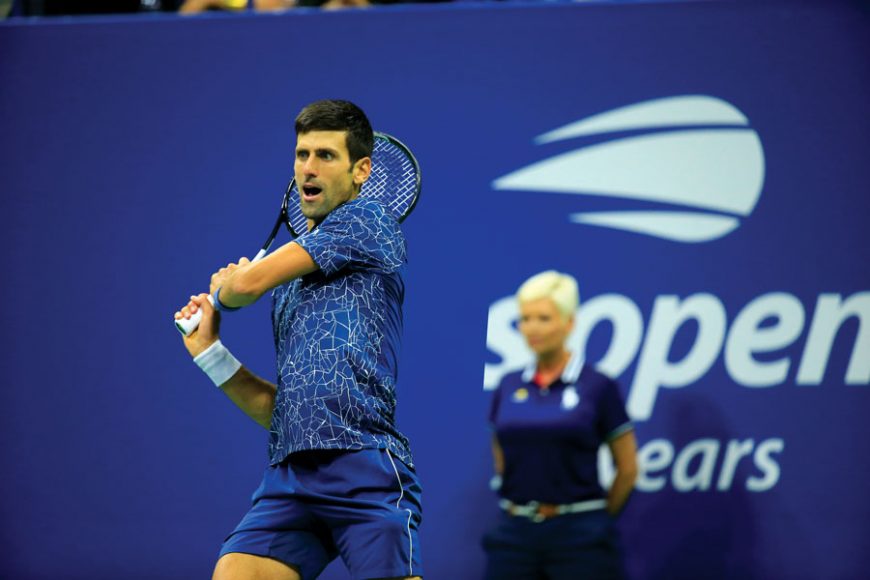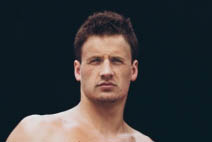If success is its own kind of failure, then failure can hold the seeds of new success.
When he won the French Open in 2016 — the last box to be checked off on his résumé — Novak Djokovic became only the third man in tennis history — behind Don Budge and Rod Laver — to hold all four Grand Slam titles. He wouldn’t win another Grand Slam for two years. In that time, he lost his number-one ranking, tumbling as far as number 18, the first time he was out of the top 15 since 2006, as he lost early in tournaments to men he used to beat with imposing ease. Djokovic even left the tour for seven months, beginning in August of 2017. Some wondered not when, but if he would be back.
In the second half of 2018, he answered them in spectacular fashion — outgunning Rafael Nadal at Wimbledon 6-4, 3-6, 7-6 (11), 3-6, 10-8 in an electric, 5-hour, 15-minute match that further cemented their rivalry as perhaps the best in the game, and then outlasting the searing heat and Juan Del Potro at the US Open, 6-3, 7-6 (7-4), 6-3. In between, he won the Western & Southern Open in Cincinnati, defeating perennial champion Roger Federer and becoming the first man in tennis history to capture the Golden Masters — at least one win in all nine Association of Tennis Professionals (ATP) 1000 events. He was, a New York Times headline said, the “unmatched star of summer.”
And even though he would lose to Alexander Zverev, who leads the surging new kids on the tennis block, in the ATP Finals, the end-of-year tournament in London, Djokovic had regained the number one ranking and the eye of the tiger. There was no question about it: The man fans affectionately call Nole is back.
So, what happened? How did Djokovic, WAG’s August 2013 cover guy, lose and regain his mojo? There was an elbow injury that had him playing in pain for two years and that finally required surgery, along with whispers of personal problems. But mostly, it seemed to be a crisis of confidence. Everyone goes through moments of self-doubt, he was quoted as saying in The Guardian after he won his fourth Wimbledon this past summer. It’s human nature.
“Speaking from this position right now, it makes it even better for me, makes it even more special, because I managed to overcome challenges and obstacles.”
Djokovic also did what many people do in recalibrating success — he made some changes even as he recommitted to the essentials. He and clothing company Uniqlo parted ways (the Japanese-based firm signed Federer for $300 million after he parted with Nike) and he became, as WAG reported, the “new Crocodile” for Lacoste.
But Djokovic — who has been coached by Boris Becker and Andre Agassi — also returned to the coach with whom he first achieved greatness, Marián Vajda. And his diet, long gluten-free because of his celiac disease, has become mainly plant based. A decorated member of the Serbian Orthodox Church, Djokovic has turned increasingly to meditation and has been known to practice it at the Buddhapadipa Temple in Wimbledon.
Some things have never changed, however, including his devotion to educating disadvantaged children in his native Serbia and around the world through the Novak Djokovic Foundation and as a United Nations Goodwill Ambassador. After winning the US Open this past summer, Djokovic auctioned off a racket he used to win the Cincinnati Masters this year and his personal limited-edition Seiko Astron GPS Solar World Time watch at Christie’s in New York to benefit his foundation.
A baseliner who nonetheless knows how to serve and volley socially, he played along with the “Today” show’s Al Roker after that US Open win, handing out Dunkin’ Donuts to astonished straphangers in a Manhattan subway and then appearing at the American Museum of Natural History where he was joined by son Stefan, a big dinosaur fan. (Djokovic and wife Jelena are also the parents of a daughter, Tara.)
It was Stefan who provided an emotional highlight of the tennis season when he spotted his father on the court after his Wimbledon triumph and cried out from the stands, “Daddy, Daddy.”
“I was visualizing, imagining this moment of him coming to the stands, cherishing this moment with my wife and me and everyone,” Djokovic later told The Guardian. “It’s hard to describe. It is a moment that I will carry inside of my heart forever.”



